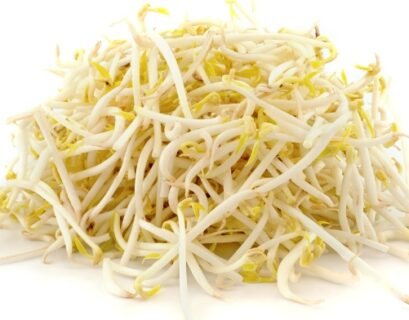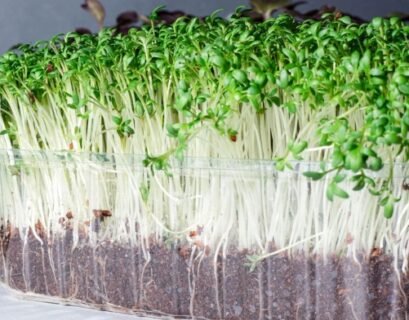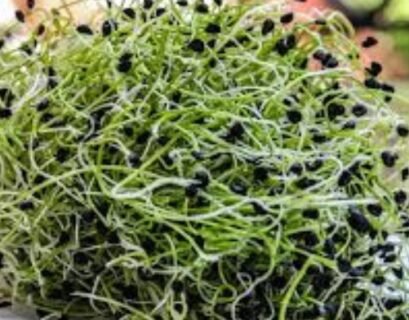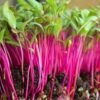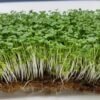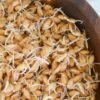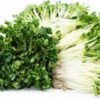If you own chickens, you know how important it is to provide your flock with a balanced diet. A varied diet keeps chickens healthy and productive, but with so many food options, it’s easy to wonder what’s safe and beneficial for them.
One vegetable you may be interested in is Brussels sprouts. So, can chickens eat Brussels sprouts? Let’s delve deeper into this topic and find out the facts.
Nutritional value of Brussels sprouts
Brussels sprouts are small, green, leafy vegetables packed with nutrients. They are an excellent source of vitamins C, K, and several B vitamins and contain essential minerals such as potassium, manganese, and iron. Brussels sprouts are also rich in dietary fiber and antioxidants, making them a healthy choice for humans and poultry.
Are Brussels sprouts safe for chickens?
When considering new food for your chickens, safety is paramount. The good news is that Brussels sprouts are generally safe for chickens. They are non-toxic and can be a nutritious addition to your diet. However, like any food, they should be handled in moderation to avoid potential problems.
Can chickens eat Brussels sprouts? Nutritional benefits

These greens are not only delicious but also nutritional powerhouses! They are rich in antioxidants, fiber, vitamins, and minerals essential for chicken health and growth.
Here are some nutritional benefits of Brussels sprouts for chickens’ diet:
Antioxidants
- Brussels sprouts are rich in antioxidants, crucial for the chicken’s immune system.
- Feeding your chickens requires an antioxidant-rich diet that helps protect them from inflammation, improves heart health, and boosts overall immunity.
- Antioxidant-rich Brussels sprouts also help eliminate free radicals, which destroy cells in the body. Free radicals come from various sources, including chicken feed.
protein
- Young chickens have high energy levels and a playful personality.
- Because of this, they need more protein to support their growth.
- Brussels sprouts are a healthy way to add an extra dose of protein to your diet.
- One cup of Brussels sprouts contains 3 grams of protein, a protein-rich food supporting growth and development.
fiber
A high-fiber diet is essential for all types of chickens. To ensure optimal health, chickens need at least 10% fiber in their overall diet.
folate
- Also known as vitamin B-9, folate is crucial for proper blood production and circulation.
- Like humans, all females, including chickens, need an excellent folate level to ensure a healthy pregnancy.
- If you have hens laying eggs or actively breeding, provide them plenty of folate-rich food. Brussels sprouts provide a good dose of folate for the day.
Manganese
- Chickens diet need manganese in their diet to produce quality eggs.
- Manganese significantly affects eggshell quality or thickness and ensures proper egg development.
Health benefits
Brussels sprouts’ vitamins and minerals can support chickens’ immune systems, bone health, and overall vitality.
Improvement of egg quality
A high vitamin content, especially vitamin K, can improve the eggs’ quality, resulting in stronger shells and more vibrant yolks.
Vitamin A
Chicks cannot produce mucus. Adding vitamin A-rich foods like Brussels sprouts can help build the mucus lining their nose, esophagus, and eyelids.
Vitamin K
- Vitamin K benefits your chicken bones and ensures blood clotting before injury.
- Vitamin K deficiency can put your chicken at risk of severe bleeding from even minor scratches or cuts.
- Also, laying hens need vitamin K because it helps with vitamin D and calcium metabolism.
- Vitamin K ensures eggshell quality. A lack of vitamin K can lead to low bone density and fractures. To prevent these problems, be sure to feed your chickens Brussels sprouts.
Vitamin C
- Brussels sprouts are also essential for chickens due to their high vitamin C content.
- Vitamin C helps your chickens maintain optimal health. Unfortunately, chickens cannot produce vitamin C on their own.
- They can only buy it from one source.
Mixed with Regular Feeds
- Mixing regular feed with Brussels sprouts is one way to give your chickens a healthy nutritional boost.
- Chop the sprouts into small pieces and incorporate them into your meal.
- This will benefit your chicken by providing twice the nutritional content of a single meal.
Chickens Overeating Brussels Sprouts: Is It Safe?
Can chickens eat Brussels sprouts?
Yes, Brussels sprouts are great for chicken! They can be enjoyed raw or cooked but cut them into small pieces if you go the raw route. They are also great for your girls’ digestive and heart health. Brussels sprouts are safe for chickens. Like any other food, moderation is essential. Generally, treats should make up at most 10% of your chicken’s diet.
- fiber
- folate
- Vitamin A
- Vitamin K
- protein
- Manganese
How to Feed Chickens Brussels Sprouts
When introducing Brussels sprouts to chickens, preparation is critical. Here are some tips:
Preparing the Brussels sprouts: Wash the Brussels sprouts thoroughly to remove any pesticides or dirt. You can cut them into small pieces so the chickens can peck at them.
Serving suggestion: Serve raw or lightly cooked. Mixing Brussels sprouts with other vegetables can be a tasty treat for your flock.
Raw Vs. Cooked Brussels sprouts.
Both raw and cooked Brussels sprouts have their benefits:
Raw Brussels Sprouts: They retain all their nutrients and are a crunchy chicken snack.
Cooked Brussels Sprouts: Cooked Brussels sprouts are soft and easily digested. Light steaming or boiling is sufficient; avoid adding spices or oil.
side effects
Overeating any food can cause problems. With Brussels sprouts, be careful:
- Problems with overeating: Too many Brussels sprouts can cause digestive upset or make your diet unbalanced.
- Digestive concerns: If your chickens show discomfort or diarrhea, reduce the Brussels sprouts you offer them.
- Other vegetables that chickens can eat
- Variety is the spice of life, even for chickens! Brussels sprouts are a green leafy vegetable that chickens can enjoy, along with spinach, kale, and lettuce.
- Root vegetables: such as carrots, beets, and sweet potatoes.
- Avoid vegetables
- Not all vegetables are safe for chickens. Avoid feeding them:
- Toxic vegetables: such as green potatoes, avocados and rhubarb.
- Signs of poisoning: Watch for signs such as lethargy, vomiting, or diarrhea, and contact a veterinarian if poisoning is suspected.
Chicken Supplements
While vegetables are great, a varied diet with the right supplements ensures complete nutrition. Common supplements include:
- Calcium: For solid eggshells.
- Sand: To aid digestion.
Homemade Chicken Delight with Brussels Sprouts
Get creative with chicken dishes! Here are some ideas:
Recipe Idea: Mix chopped Brussels sprouts with grains, seeds, and other vegetables.
Mix with other ingredients: Combine with corn, peas, or fruit for a balanced treat.
Common Myths About Chicken Diet
Many things need to be clarified about chicken feed. Here are some myths debunked:
- Debunking Misconceptions: Chickens don’t need an all-grain diet; They thrive on variety.
- Reliable sources of information on chicken feed: Consult veterinary advice or recognized poultry guides.
Conclusion
Brussels sprouts can be a safe, nutritious treat for chickens when fed in moderation. They provide various health benefits and can diversify your flock’s diet, resulting in happier, healthier chickens. Remember to balance your diet with different foods and watch portions to avoid potential problems.
FAQ
Can chickens eat Brussels sprout leaves?
Yes, chickens can safely eat the leaves of brussel sprouts.
How often should I feed my chickens vegetables?
Vegetables should be a regular part of your diet rather than the primary food source. Eating them a couple of times a week is ideal.
Are there any vegetables that are especially beneficial for chickens?
Leafy green vegetables, carrots, and squash are particularly beneficial due to their high nutrient content.
Can baby chicks eat Brussels sprouts?
It is best to wait until the chicks are a few weeks old before introducing new foods like Brussels sprouts.
How can I make sure my chickens have a balanced diet?
Provide a combination of commercial feed, fresh vegetables, cereals, occasional treats, and any necessary supplements.



